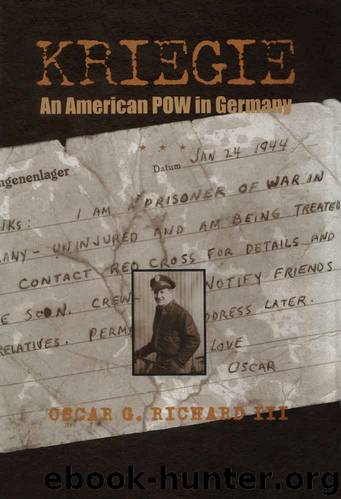Kriegie: An American POW in Germany by Oscar G. III Richard

Author:Oscar G. III Richard [Richard, Oscar G. III]
Language: eng
Format: mobi
Publisher: LSU Press
Published: 2000-05-01T04:00:00+00:00
Ten
Colonel Spicer Sounds Off
* * *
Lighting in the barracks rooms was entirely provided by a single low-wattage bulb suspended from the center of the ceiling until one of our enterprising inmates decided to improve the system. Some fine wire, stolen from a tunnel-detecting device, was strung between the ceiling boards around the room and connected to slightly protruding nails in the ceiling above each bunk. Sockets, fashioned from Nescafé cans, were disconnected and hidden during the day. German soldiers traded light bulbs for cigarettes. Our contraband lighting system, however, came to an abrupt end one night near the end of 1944 when our security system uncharacteristically lapsed. A German sergeant entered our barracks room unannounced and stared, open-mouthed, at the lights strung around the room, whistled softly, then exclaimed, “Jeeeee-suuus Christ!” Thus ended our time of bright lights.
To warn barracks occupants that a German was approaching we stationed prisoners at the entrances to each end of the building. We took turns, each working shifts of three hours during the day. If a sentry spotted a German headed for a barracks, he would yell, “Goon Up,” the signal to halt escape activity or to hide contraband. We told the Germans the word “Goon” was an acronym for “German Officer Or Noncom,” but they later figured out this was an insult.
Occasionally an RAF bombing raid would provide a distraction. If it were dark, all lights in the camp would go out, and the kriegies would peer out the ventilating slots above the windows to watch the show. We saw the bombers of the Eighth Air Force go over for the first time on Easter Sunday morning, 1944. Rostock, thirty miles northwest of camp, was the apparent target, and we could see the smoke bombs, signaling bombs away, and feel the steady rumble of explosives shaking the earth. Father Charlton was conducting mass on the parade ground at the time.
Sightings of the armadas of the Eighth Air Force became more frequent as the war progressed and the bombers penetrated deeper into Reich territory. Each time the planes flew over, the inmates of the camp gathered outdoors to cheer their comrades. But most exciting were the strafing raids. RAF Mosquitoes would swoop down on nearby airfields and unwary locomotives so quickly the German air raid alarm system wouldn’t go into action until the twin-engined fighters were winging their way back to England.
American P-51S hit a nearby airfield several times after escorting the heavy bombers on long missions. We saw one go down just off shore one afternoon, a trail of black smoke in its wake. The crews apparently were well briefed on the location of prison camps, because no matter how near to our camp was their target, we were not hit. We had our anxious moments, though.
After one particularly exciting strafing foray, camp authorities issued orders that no one was to be outside the barracks from the time the siren sounded the local alarm until the all-clear signal. It seems reasonable to suppose
Download
This site does not store any files on its server. We only index and link to content provided by other sites. Please contact the content providers to delete copyright contents if any and email us, we'll remove relevant links or contents immediately.
| Africa | Americas |
| Arctic & Antarctica | Asia |
| Australia & Oceania | Europe |
| Middle East | Russia |
| United States | World |
| Ancient Civilizations | Military |
| Historical Study & Educational Resources |
The Radium Girls by Kate Moore(12028)
100 Deadly Skills by Clint Emerson(4925)
Rise and Kill First by Ronen Bergman(4789)
The Templars by Dan Jones(4689)
The Doomsday Machine by Daniel Ellsberg(4490)
The Rape of Nanking by Iris Chang(4213)
Killing England by Bill O'Reilly(4001)
Stalin by Stephen Kotkin(3965)
Hitler in Los Angeles by Steven J. Ross(3946)
12 Strong by Doug Stanton(3550)
Hitler's Monsters by Eric Kurlander(3343)
Blood and Sand by Alex Von Tunzelmann(3205)
The Code Book by Simon Singh(3189)
Darkest Hour by Anthony McCarten(3133)
The Art of War Visualized by Jessica Hagy(3007)
Hitler's Flying Saucers: A Guide to German Flying Discs of the Second World War by Stevens Henry(2754)
Babylon's Ark by Lawrence Anthony(2679)
The Second World Wars by Victor Davis Hanson(2524)
Tobruk by Peter Fitzsimons(2518)
